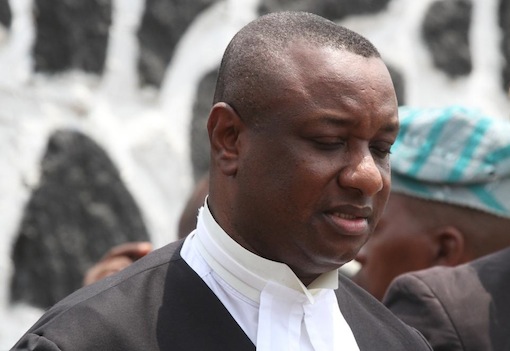
The Director of Media of the Muhammadu Buhari Campaign Organisation, Festus Keyamo, on Monday said the Nigerian government is paying for ‘premium’ on petroleum products and not subsidy.
Mr Keyamo spoke Monday while featuring on a Channels Television morning programme, Sunrise Daily.
The lawyer featured alongside the spokesperson of the Atiku Abubakar campaign organisation, Segun Sowunmi.
While Mr Sowunmi pilloried the Nigerian government for the manner it has steered the affairs of the country, saying the Buhari government had no integrity, Mr Keyamo said the government was “putting Nigeria on the path of economic recovery and growth”.
He added that the sleaze that took place in the previous government of the opposition People’s Democratic Party (PDP) no longer occurs.
The lawyer said contrary to what happened during the government of former president Goodluck Jonathan, the government is not making payments to individuals but paying ‘premium’ through the Nigerian National Petroleum Corporation (NNPC) to alleviate the suffering of Nigerians.
“What happened under the PDP government was that they were paying for products that did not land at all,” Mr Keyamo said. “That was the scam that was happening, It was fraud, the greatest stealing in the history of this country happened under them.
“All the PDP bigwigs were all involved in this subsidy scam, then you saw that many of them refunded money. Like I said, they were paying for products that did not land at all, they will tell you they have brought product and you have to pay subsidy on those products.”
At the point when there was an increase in (pump) price, Mr Keyamo said, there was a slump in oil prices.
“The government wanted to eliminate subsidy at that time, but as the price of crude went up, the price of production went up, and the bye-products also went up, it is normal,” he added.
He explained further that at the point when oil was $28 to $30, government was not paying subsidy and everything was okay.
“The delta occurred, the difference occured, when oil prices went beyond $43 per barrel, because that was the benchmark. As it rose beyond $43, the delta started, not subsidy. We started to pull away from N145.
“So the landing cost as at today came to N203/N205, and we are still selling for N145 because the president said you cannot suffer the masses (make the masses suffer). Now how do they cover it? Not subsidy, unlike what happened before.
“Now, you know the petroleum act, the NNPC Act allows the NNPC to make refunds to the federation account less their net; in other words, they can spend money and return the balance to the federation account, by law.”
The subject of payments made by Nigeria’s national oil company on differentials incurred on petrol importation has been marred in controversies in recent time.
Last December, the NNPC said the Nigerian government had been resisting intense pressure to increase the pump price of petrol , noting that the landing cost of the commodity was N 171.4 per litre as of December 22, 2017 when oil price was around $64 per barrel. Analysts said the figures have since balooned following increase in oil prices.
But on Monday, Mr Keyamo explained that NEC and FEC often deliberate on the payments, adding that the books are open for perusal on the payments made for the said ‘premium’.
“Now, when FEC – they all sit at the end of the month – and NEC, involving PDP governors; the books are open for them to say this is the difference we pay for ‘premium’. I told you we are not paying private people this time.”
When asked why the system for payment of the so-called ‘premium’ is opaque, he said it is now in the 2019 budget proposal.
“It is that premium – the money on landing cost and all that. It has been put in the 2019 proposal now, the budget,” he said.
“You can see that he (Showunmi) can come here and talk but even PDP governors cannot raise this issue. They cannot.”
Earlier in June, the immediate past Minister of Finance, Kemi Adeosun, criticised the corporation for bringing forth for sharing at the FAAC meeting, revenue she described as “unacceptably” low. Mrs Adeosun spoke after a meeting of the Federation Accounts Allocation Committee (FAAC) ended in a deadlock because the revenue remitted by the Nigerian National Petroleum Corporation (NNPC) was poor.
Members of the committee dispersed from the auditorium of the finance ministry, venue of the meeting, in despair refusing to share the funds proposed by the NNPC. The corporation’s revenue, among other concerns, is being affected by payments made as differentials on importation of products, according to analysts.
END

Be the first to comment